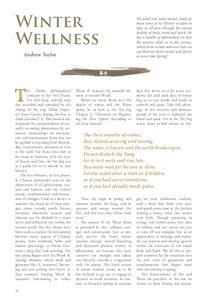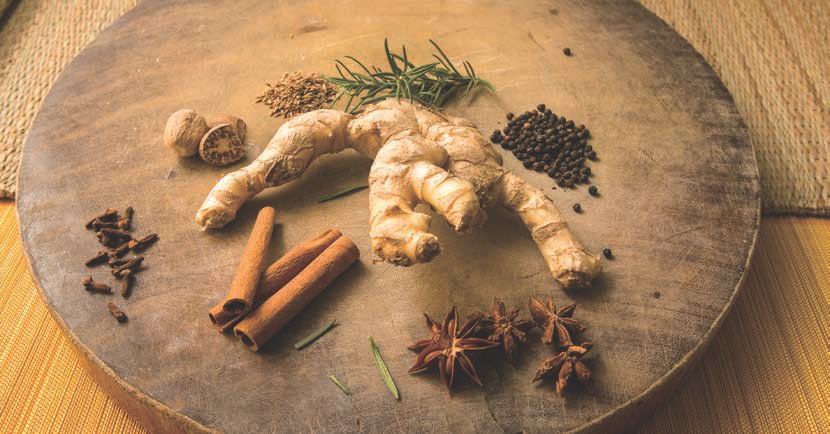
 |
|

The Daoist philosophical concepts of the Five Phases, Yin and Yang, and Qi were first recorded and compiled in the Huang Di Nei Jing (Yellow Emperor's Inner Canon) during the first to third centuries CE. This seminal text explained the correspondence of naturally occurring phenomena by systematic relationships on microcosmic and macrocosmic levels that can be applied to anything from lifestyle, diet, environment, emotions or even to life itself. For those who wish to live more in harmony with the ways of Nature and Dao, the Nei Jing acts as a guide for us to remain in that balance.
The five elements, or five phases, in Chinese philosophy rests in the observation of all phenomena, natural and human, and the cyclical nature, transformation and interaction of energies. Used as a device to associate the character of these energies, colors, sounds, smells, flavors, emotions, directions, seasons, and climates can be defined in a more active and influential way within the natural world. The five phases have been used to explain the relationship between many aspects of Chinese society, from medicinal herbs and human physiology to Daoist Geomancy (feng shui) and astrology. The first phase begins with the Wood 木 (spring) element, which feeds and generates Fire 火 (summer), becoming ash and turning into Earth 土 (late summer), bearing Metal 金 (autumn) functioning to collect 27 Water 水 (winter) the essential element to nourish Wood.
The three months of winter, they denote securing and storing. The water is frozen and the earth breaks open. Do not disturb the Yang. Go to rest early and rise late. You must wait for the sun to shine. Let the mind enter a state as if hidden, as if you had secret intentions, as if you had already made gains.
Before we move down into the depths of winter and the Water phase, let us look at the Nei Jing Chapter 2, "Discourse on Regulating the Shen (Spirit) According to the Four Seasons". Thus, the sages in spring and summer nourish the Yang, and in autumn and winter nourish the Yin, and this way they follow their roots."
The essence of the Water phase is pervaded by rest, stillness, storage, and conservation. Just as animals survive the harsh winter weather through slowed breathing and decreased physical activity in hibernation, we humans also must conserve our energies and adjust our lifestyles towards a congruence with the season. The harsh nature of winter weather causes us to be less inclined to go out or engage in physical or social activities. In contrast to beautiful spring or summer days that invite us to be active outdoors, the cold, dark days of winter beg us to stay inside and reside in warmth and quiet. Take full advantage of this inactive and dormant period of the year to replenish the mind and spirit. Do as the Nei Jing states, retire to bed earlier, sit longer on your meditation cushion, read a book that feeds your soul, and spend more time in the kitchen making a hearty meal that warms your belly. Though persisting in storage and conservation, this time of stillness and rest serves not just to turn off our energies, but as an opportunity to recharge and replenish our reserves and develop growth within the structures of our mind, body and Spirit. We do this to prepare ourselves for the transition into the new cycle of generation and transformation that begins anew with the coming of spring.
The characteristics of Yin and Water are prevalent in the teas we choose to brew during this season. Water, being the most Yin of the five elements, contains the attributes of cold, darkness, slowness, softness, wetness, the feminine, dormancy and a direction moving inward and downward. Teas that are darker in color, contain Qi that penetrates into the deeper regions of the body and warm us from head to toe are most appropriate during these cold winter months. Our young sheng puerh cakes and lighter oolongs are put in storage, waiting for the warmer months ahead to be taken off the shelf again. She hibernates peacefully in our tea cabinets, and like us, will also experience structural and energetic transformations that we will share in our next meeting. Now on the front of our shelves, we keep our best aged shou puerh, black teas, red teas, roasted and aged oolongs, and snow chrysanthemums.
To prevent adverse effects from the harsh cold of winter, preservation of the body's deep seated warmth and heat will keep us healthy and in balance for the year to come. In Chinese Medicine, an excess of cold energy in the body is one way that allows disease to develop. Women especially can be affected by this cold "evil" and should take extra caution by protecting their Yang energy. This can be done with a diet of foods whose character is Yang in nature and functions to warm the body and/or helps to expel cold. Many medicinal herbs used in Chinese Medicine from the Materia Medica are actually ingredients most of us may have in our kitchen cabinets. The herbs and spices that are commonly used for winter cooking are warming in nature, such as cumin, clove, nutmeg, rosemary, cardamom, black pepper, cinnamon and ginger. Not only are these ingredients essential to increasing our warming Yang energy of the body, but they taste great too! Other foods that are warming include fennel, star anise, sweet basil, dates, vinegar and mustard seeds. These ingredients are easy to include for making delicious stews and soups or pickling vegetables.
Here in Taiwan, believe it or not, the winter is quite chilly and brings heavy winds and rain with it. Simply staying inside does not allow one to avoid the cold as most houses are not equipped with heat or insulation, and the floors are made of concrete or tile. Preservation of our body temperature while inside remains important throughout the winter, so our favorite activity at the Tea Sage Hut this time of year is our weekly trip to the local hot springs. The high mineral content and 42-degree water leave us in a deep state of warmth, relaxation and quiet contention for the whole day. Bathing in hot springs was traditionally an essential part of Buddhist and Daoist monks' lives, as a way to cleanse and purify the body by the divine water. Just ask Wu De about his favorite places in Taiwan, and he will most certainly recount his experiences at the transcendental geothermal springs at Yang Ming Mountain National Park. Even if you do not live nearby heavenly waters like us, do yourself a favor by taking a hot bath with some added mineral salts and enjoy a few hours of wintertime in warm stillness and quietude.
The winter provides a great environment and opportunity to slow down, regenerate ourselves and dive deeper into the depths of Spirit. Taking time now for longer tea sessions or meditation will create lasting habits for the year to come. The warmth, brightness and luminance of summer cease to exist without these cold and dark days of winter. Let us be grateful for the dualities of life, the extremes of the seasons, the times for action and inaction and fully celebrate the changing ways of Nature. I raise a steaming bowl with you, in warmth of heart and spirit!
